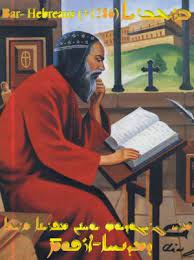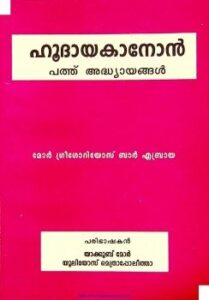Mar Gregorios Bar Hebraeus | Jul 30/31 I 1226 – 1286

Gregory Bar Hebraeus (1226 – 1286), Syriac name Mar Gregorios Bar Ebraya, was one of the most learned, erudite and a versatile broadminded bishop of the Orthodox Syrian Church, philosopher, poet, grammarian, physician, Bible commentator, historian, Polymath and theologian of all times and generations.
He was extremely fond of learning since his childhood. He learnt medicine from his father, studied the available Holy books with interpretations. Under the care of his father, he began as a boy, from his tender childhood, the study of medicine and of many other branches of knowledge, which he never abandoned. Bar-Hebraeus spent a lot of time at the Moghul court, where he served as physician to Hulagu Khan. He wrote on a wide variety of topics, from theology to medicine. The most important work of Bar Hebræus is ‘Storehouse of Secrets’, a commentary on the entire Bible. One of the most important historical works of the Syriac tradition, is the world history, the Chronography of Bar Hebraeus, which attempts to provide a history of the world from Adam until Bar Hebraeus’ own lifetime.

Bar Hebraeus was born in the village of Ebra, near Malatya, now in the province of Elazig, in modern Turkey. Bar-Hebraeus was born with the name Abū’l-Faraj, also known by his Latin name Abulpharagius. It seems, he was baptized with the name John-nan, but he took the name Gregory (Gregorios) at his consecration as a bishop. Throughout his life, he was often referred to by the Syriac nickname Bar-Ebrāyā, which is pronounced and often transliterated as Bar-Ebroyo, and to the Latinized name Bar-Hebraeus. This nickname is often thought to imply a Jewish background, Son of the Hebrew. He was the son of a Jewish physician Aaron, converted to Christianity.
Bar Hebraeus emigrated to Antioch (now Antakya, Turkey) and at the age of 17 became a hermit. He took his monastic vows, probably while he was here. Bar Hebraeus’ main vocation in life was his spiritual quest. He was made a bishop at 20 and an archbishop at 26. In 1243, when the Mongol armies threatened to invade so, a large part of the population fled to Aleppo. In 1264, he was made primate, or maphrian, of the East by Ignatius III. During the years 1264 until his death, he was based in the Monastery of Mar Mattai in Mosul, although he also traveled teaching and exercising Episcopal duties. He was placed over the diocese of Aleppo by Dionysius, Metropolitan of Melitene (1252). He was a maphrain-catholicos (Chief bishop of Persia) in the 13th century. He acquired fluency in a number of languages, including Armenian, Persian at least “in the latter part of his life” and possibly Mongolian and also probably Greek and Hebrew.
The Canon Law accepted and followed by the Malankara Orthodox Church was collected and codified by Mar Gregorios Bar Hebraeus. He was a versatile genius and a total of 31 works is attributed to his authorship. These cover theology, history, medicine, Metaphysics, and liturgy, like ‘Lamp of the Sanctuary’, ‘Book of Rays’, ‘Book of Ethics’, ‘Book of the Dove’. Bar Hebræus has left besides many other works. On grammatical subjects we have the ‘Book of Splendors’ and ‘Book of the Spark’.

He was one of the most prolific and great authors in the Syriac Orthodox tradition. He worked tirelessly for the interests of the Orthodox Syrian Church and entered into dialogue with numerous political & religious leaders to secure the position of the Church & her faithful in society. He was a great scholar in Church History and Canon Law of the Church. Having carefully and judiciously scrutinized the verdicts of the Church Fathers and the decrees of the provincial and ecumenical councils he collected them, edited and classified under different heads. The original work in Syriac contains forty chapters and is called by the name ‘hoodoyo canon’. The word ‘hoodoyo’ means “explanations”. called Kethabha dhe – Hudhaye, ‘Book of Directions’. Bar-Hebræus’ scholarly reputation earned him wide respect. His main historical work of ‘Chronicle’ presents all the knowledge of him and his predecessors in the field of history and consists of two parts.
On a visit to Maragha (Persia), Bar’Ebroyo fell ill with fever. He reposed in the Lord at the age of 60 was buried in the Church of Maragha, but his remains were later transferred to Monastery of Mattai (Matthew). He is commemorated by the Orthodox Church, on July 30/31.
Quotes of Gregorios Bar Hebraeus
Patience is a wonderful quality, but life is too short
If you want to hide something from your enemy, do not tell your friend as well, as there’s no guarantee that your friendship will last forever
Stupid people notice shortcomings instead of merits
Small failure is better than small success
It’s better to starve sometimes than overeat
Knowledge is such a precious thing that can be taken from any source
Do not rely on an impulsive friend even if he’s a kind person
Who can be considered smart? Those who make their dreams come true
Too much food is as dangerous for body as too much water for plants
Any vice is punished in the end
Presidents need wise people more than wise people need presidents
Drunkenness is the mother of all vices
I often regret about what I had not said but I never regret about my silence
The heaviest insult is usually caused by the one you have never hurt
Patience is a great quality, but life is too short to endure for long
The soul without wisdom is dead
Fools notice only the mistakes of people and do not pay attention to their dignity. They are like flies, which strive to sit only on the inflamed part of the body
Condescending attitude towards the stupidity is inherent to every intelligent person

0 Comments